The College Press NIV Commentary: New Testament (CPNIV) (19 vols.)
Digital Logos Edition
Overview
The College Press Commentary series, which is based on the New International Version Bible, blends solid scholarship with practical usefulness. It is a non-technical commentary written with the layperson, Bible study leader, preacher, or youthworker in mind.
The Logos Bible Software edition contains the complete text of all 19 printed volumes, totalling nearly 6,500 pages of commentary that works verse by verse through every book of the New Testament. The commentary can be set to scroll synchronously with your preferred Bible, can be instantly searched for a word, phrase, Bible reference, and more.

- Nineteen volumes of The College Press Commentary
- Verse-by-verse commentary
- Search by word, phrase, Bible reference, and more
- Title: College Press NIV Commentary Series: New Testament
- Publisher: College Press
- Volumes: 19
- Pages: 6,514
This title is included in the following collections
You can save when you purchase this product as part of a collection.
College Press NIV Commentary (...
$744.58$549.992025 Leader Gold Library
$849.99$679.992025 Charismatic Gold
$849.99$679.99Nuevo Comentario Americano del...
$927.99$927.99
- $1,499.99$1,199.99
- $1,499.99
- $1,499.99
- $2,999.99$2,249.99
- $2,999.99$2,249.99
- $2,999.99
- $2,999.99
- $2,999.99
- $2,999.99
- $2,999.99
- $2,999.99
- $4,749.99$3,562.49
- $4,749.99
- $4,749.99
- $4,749.99
- $4,749.99
- $4,749.99
- $6,399.99$4,799.99
- $10,999.99$8,249.99
- $11,399.99
- $23,999.99$17,999.99
- $21,749.99
- $24,999.99
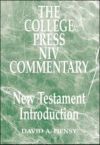
New Testament Introduction
- Author: David A. Fiensy
- Publisher: College Press
- Pages: 409
This book is aimed at both college students and the interested Christian reader. Teachers may wish to give assignments from C.K. Barnett, The New Testament Background (NTB) to supplement the understanding of the New Testament environment. To this end, suggested readings have been added in many of the bibliographies.
David Fiensy, Ph.D., has been a professor at Kentucky Christian University since 1995. Prior to this he served for six years as the Senior Minister at Grape Grove Church of Christ, Jamestown, Ohio.
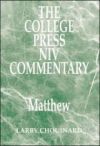
Matthew
- Author: Larry Chouinard
- Publisher: College Press
- Pages: 512
The Gospel of Matthew provides us with intriguing answers to these questions through the life story of the Lord Jesus. Through precise and well thought out commentary, Dr. Chouinard underscores the text of Matthew with historical insights, textual research and cultural understandings tha tbridge nineteen centuries of time, animating the spectacular story of God coming to save his people!
Divided into five major discourses, Matthew's Gospel seeks "common ground" between deity and humanity. This "common ground" provides the Christian with all of the tools needed to train, equip, rebuke and exhort in all righteousness and for all occasions. Matthew is the epitome of readiness. This is the spiritual food every Christian needs to grow a healthy spiritual life with a strong focus on Christ.
Larry Chouinard received his BA and MA from Alabama School of Religion, his MTh from Harding Graduate School of Religion, and his PhD from Fuller Theological Seminary. Currently he is professor of New Testament at Kentucky Christian College.
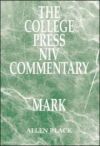
Mark
- Author: Allen Black
- Publisher: College Press
- Pages: 295
What would you give up to spend just one hour with Jesus as he walked along the Judean countryside? What would you ask him as you walked along the Sea of Galilee? Believed by some to be the first Gospel account of Jesus' life, the Gospel of Mark captures all of the emotion and marvel of the Son of God! Written from the memoirs of the Apostle Peter by his self-proclaimed "spiritual son" John Mark, the Gospel of Mark tells the miraculous story of God's plan to redeem all people who will call on his name. With authority and power, Mark leads us through life-changing encounters of everyday people as they were touched and made whole by Jesus; emotionally, physically, and most importantly spiritually. Your life will be changed and your soul revived as you study the Gospel of Mark through the NIV Commentary Series.
Allen Black, PhD, is Associate Professor of New Testament at Harding University Graduate School of Religion. Dr. Black holds the AA in Bible from Freed-Hardeman University, the BA in Bible and English along with the MTh in New Testament from Harding University, and the PhD from Emory University.
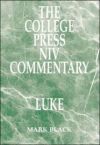
Luke
- Author: Mark C. Black
- Publisher: College Press
- Pages: 394
Luke and his first readers were very much like us. They were not among the first generation of believers. Yet these readers of the Gospel of Luke were educated people, having been raised of the best human thinking. Being bright and inquisitive, yet knowing the basics about Jesus and his followers, they had many questions. And Luke gave them answers.
The single goal of the present commentary is to place modern readers into the shoes of the first readers of Luke's Gospel. The assumption behind this commentary is that we can only know what Luke means if we know what Luke meant. We are especially fortunate in this regard to be examining the Gospel of Luke, since Luke, more than any other Gospel writer, tells us what the message of Jesus meant in a later day. To give his readers this information, Luke provides a sequel—the book of Acts. The present commentary therefore looks at the Gospel of Luke from the perspective of Acts, the best commentary on Luke's Gospel, and with a view toward the modern church.
Mark C. Black, PhD, is Associate Professor of Bible at David Lipscomb University, Nashville, Tennessee. He is also Associate Minister at the Donelson Church of Christ.
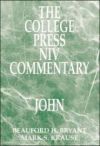
John
- Author: Beauford Bryant and Mark Kraus
- Publisher: College Press
- Pages: 415
The Gospel of John is an easy read for first-time seekers and new Christians. At the same time life-long scholars marvel at its content. Late in the Gospel, John revealed his purpose for writing. "These are written that you may believe that Jesus is the Christ, the Son of God, and that believing you may have life in his name" (20:31). The authors of this commentary have focused on John's intended message for Christians in his day, and by extension, Christians today.
Beauford H. Bryant received several degrees during his college years: Johnson Bible College, BA; Phillips University, MA and BD; Princeton Theological Seminary, MTh; University of Edinburgh, PhD He also studied at the University of Chicago, Harvard University, the University of Marburg, the University of Tübingen, and Oxford University.
Mark S. Krause, PhD was a faithful student under the leadership of Dr. Bryant. His personal relationship with Dr. Bryant made him the logical choice to finish this commentary. Dr. Krause is currently Professor of Biblical Studies and Academic Dean at Puget Sound Christian College, Edmonds, Washington.
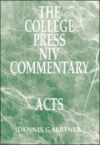
Acts
- Author: Dennis Gaertner
- Publisher: College Press
- Pages: 431
The book of Acts is pivotal not only in our understanding of the events which established the Church of Jesus Christ, but also for providing a connecting link between the four Gospels and the Epistles of the New Testament. Without this record or knowledge of how the message of Jesus Christ came to be a missionary plea to the whole world would be severely weakened.
Dennis C. Gaertner, PhD, was professor of New Testament at Johnson Bible College and minister of Meadowbrook Christian Church in Johnson City, Tennessee. Dr. Gaertner holds the BRE from Great Lakes Bible College, the ThM and the PhD from Southern Baptist Theological Seminary.

Romans Volume 1
- Author: Jack Cottrell
- Publisher: College Press
- Pages: 280
God's word is a lamp to our feet and a light for our path (Psalm 119:105), and no part of it shines more brilliantly than the book of Romans. The truth of God's Word sets us free (John 8:32) and Romans teaches us the most liberating of all truth. God's Word is sharp and piercing like a sword (Hebrews 4:12), and no blade penetrates more deeply into our hearts than Romans. Martin Luther called the Epistle to the Romans "the greatest book within the greatest book." He undoubtedly was referring to the awesome power of God revealed in Romans. This power, contained within Paul's Epistle, has saved lives, changed hearts and altered the very course of human history. American churches have tended to concentrate on the book of Acts. Acts is a tremendous book, especially when it comes to building New Testament churches. However, Romans is to Acts what meat is to milk. As a group we need to mature; we need to move from Acts to Romans. The Apostle Paul understood the power of the Gospel of Christ. His Epistle reveals salvation on an intellectual and spiritual level not attainable by any other work or religion. It is this challenge to the intellect of men and women that produces historic change. The Epistle to the Romans is, therefore, an intellectual guide to Christianity.
Jack Cottrell, PhD, is professor of theology at Cincinnati Christian Seminary, Cincinnati, Ohio. He holds degrees from Cincinnati Bible Seminary (AB) , University of Cincinnati (AB), Westminster Theological Seminary (MDiv), and Princeton Theological Seminary (PhD).

Romans Volume 2
- Author: Jack Cottrell
- Publisher: College Press
- Pages: 280
This volume on the second half of Romans addresses some of the most difficult passages within the book. The power in the Epistle to the Romans is as important today as it was in years past. If Christians today are going to evangelize the world and reverse the losses of the past century we must rediscover the power of God's salvation exposed and explained in Romans.
Jack Cottrell, PhD, is professor of theology at Cincinnati Christian Seminary, Cincinnati, Ohio. He holds degrees from Cincinnati Bible Seminary (AB) , University of Cincinnati (AB), Westminster Theological Seminary (MDiv), and Princeton Theological Seminary (PhD).
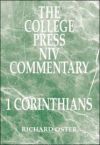
1 Corinthians
- Author: Richard E. Oster, Jr.
- Publisher: College Press
- Pages: 412
First Corinthians was written to a church rocked by division, with great cracks developing over worldly issues. The church at Corinth is a warning of what our churches today are fast becoming. The beloved church of the Corinthians had become world based, glory motivated, and grounded in immorality. But there was hope, found in a detailed plan by Paul intended to bring the Corinthian church back to repentance, unity, and most importantly back to God. We call this plan 1 Corinthians, a letter written for the sake of restoration. This makes 1 Corinthians one of the most important books we can turn for leadership, as we bring our churches back to God. It is in this letter that we find many of the basic truths that we hold today. Paul covers the sanctity of marriage, the spiritual destruction that comes with sexual immorality, issues of civil law, and the discipline of Christian brothers and sisters who refuse to put off their evil ways. Of special interest today are the sections on spiritual gifts and the chapter on the resurrection. 1 Corinthians deals with most of the issues in our churches today. It will bring to you a greater understanding of how God expects his church to be—fully devoted to Him in love and unity.
Richard E. Oster, Jr., PhD received his BA from Texas Tech University in 1969, his MA from Rice University in 1971, and his doctorate from Princeton Theological Seminary in 1974. He has done special studies at Princeton Theological Seminary and research at Franz J. Dolger Institut an der Universität Bonn.
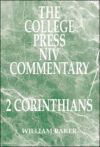
2 Corinthians
- Author: William R. Baker
- Publisher: College Press
- Pages: 470
Second Corinthians plunges the modern reader back to the real, tumultuous of early Christianity. The simple ideals of sharing and goodwill described in Acts 2:42-47 seem to have little place among the diverse converts from this boomtown of Corinth where Paul chooses to anchor his Greek mission. Second Corinthians is in part a letter of joy, for a report came to Paul that the Corinthians had rejected the troublemakers and wished to rejoin themselves to him. Heart and passion rise to the surface in this letter. Not wanting to boast about himself, Paul indicates that the Corinthians themselves were his letter of recommendation. He appealed to their firsthand knowledge and experience. Paul also recounted the tribulations he endured to keep spreading the gospel.
William R. Baker, is professor of New Testament at Cincinnati Christian University. Dr. Baker graduated from Lincoln Christian College with a BA in ministry and music in 1974. He went on to earn the MA and MDiv from Trinity Evangelical Divinity School in 1976 and 1978. He completed doctoral studies at the University of Aberdeen in Scotland in 1987. Dr. Baker is the general editor of the Stone-Campbell Journal.
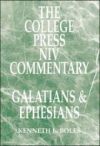
Galatians & Ephesians
- Author: Kenneth Boles
- Publisher: College Press
- Pages: 346
Galatians: Throughout the history of the church the message of Galatians has been needed to free men from chains of false doctrine. Repeatedly men have turned away from grace to bow at the altar of law. Desperate to claim at least part of the credit for their own salvation, they have chosen to believe that they are saved by keeping enough rules, enduring enough pain, or siding with the orthodox on enough of the "issues." Then someone will read Galatians again and the liberating message of the gospel of grace catches fire once more, and the bonds of legalism are burned away. Ephesians: We are saved by grace through faith! We do not earn our salvation—it is the gift of God! Even though we were dead in sin and fully deserved God's wrath, He saved us and brought us into the body of Christ. It is a glorious privilege to be a part of his body, and it carries with it a glorious responsibility. We are saved by grace, for good works. God saves us so that He could live in us and work through us. We are filled with his fullness and re-created in his likeness. We are imitators of God. His power works in us, making possible more than we could ever ask or think. We are strong in the Lord and in His mighty power. The message of Ephesians is a message of salvation: God gives it; man lives it!
Kenneth L. Boles is professor of New Testament and Greek at Ozark Christian College. Mr. Boles holds a BTh degree from Ozark Bible College and the MA in Biblical and Patristic Greek from Abilene Christian University. In addition to teaching classes in beginning, advanced, and third-year Greek, he also teaches exegetical courses in Prison Epistles.
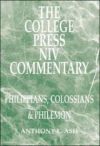
Philippians, Colossians, & Philemon
- Author: Anthony Ash
- Publisher: College Press
- Pages: 254
There are certain themes sounded throughout Philippians which can be an enriching pursuit by the serious student. This volume will help you explore those themes.
Personal information is generally shared in letters like Colossians. This would be especially important because there would be concern over Paul's condition as a prisoner. But the troublesome teaching is the chief burden of the letter. Paul describes this heresy in 2:8, 16-23, and in the rest of the book he attacks it, either frontally or in more subtle ways.
Philemon is the shortest of Paul's letters is similar to private correspondence of the day, but because of its inclusion in the New Testament and its skillful application of Christian principles, it is a very important letter for us.
Anthony L. Ash, PhD, is professor of Biblical Studies at Abilene Christain University and minister at Minter Lane Church of Christ, Abilene, Texas. Dr. Ash holds the AA from Florida Christian College, the BS from Florida Christian College, the MA from Abilene Christian University, and the PhD from University of Southern California.
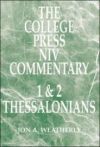
1 & 2 Thessalonians
- Author: Jon Weatherly
- Publisher: College Press
- Pages: 302
Paul met furious and violent opposition from the Jewish community at Thessalonica in his attempts to spread the Good News. With disregard for their own safety a small group from the Jewish community pledged their faith to Jesus. They were joined by Gentile converts and formed the Thessalonian Church. These bold converts found a special place in Paul's heart. The letters to the Thessalonian church are among the most personal of all of Paul's letters for this very reason. The main points revolve around personal reminiscences, commendations, counseling, exhortations and the Second Coming of Christ. Paul strongly emphasizes the hope we have in the return of the risen Christ. Following quickly on the heels of this exhortation to be ready, are instructions on the duties involved in the Christian life. These two letters merit close examination for their application to our lives today. Upon study we learn that the Thessalonian church made several errors in their understanding of what Paul meant about the imminent return of our Lord. Even today many have claimed an exact date and time when Jesus did not return! Secondly, we must diligently look at 1 & 2 Thessalonians for the hope of the resurrection found in Jesus' Second Coming that Paul preaches. It is this hope that will comfort us when our loved ones "go home" to be with the Lord. Thessalonians, written long ago, is for us today!
Jon A Weatherly, Ph.D. is associate professor of Bible Studies, teaching New Testament, Greek, and Hermeneutics at Cincinnati Bible College & Seminary, Cincinnati, Ohio. Dr. Weatherly received his B.A. in Bible & Christian Ministries from Cincinnati Bible College, the M.A., in New Testament from Cincinnati Bible Seminary, the M.Div. (Summa Cum Laude) from Trinity Evangelical Divinity School, and the Ph.D. in New Testament from the University of Aberdeen (Scotland).
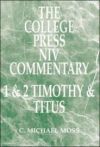
1 & 2 Timothy & Titus
- Author: Michael Moss
- Publisher: College Press
- Pages: 264
While several passages in 1 and 2 Timothy and Titus have provided the fodder for tomes of theological discussion (e.g., 1 Tim. 2:9-15 and the role of women; 1 Tim. 3:11 and deacons; 1 Tim. 3:1-8 and Titus 1:6-9 and the characteristics of those to serve as elders), the real value of these epistles lies in their message to two young ministers, to second generation believers in Ephesus and yo a young church facing a pagan world in Crete. These epistles provide teaching which the church in the twentieth and twenty-first centuries needed to hear.
The two letters to Timothy and the letter to Titus stand in a very close relationship to one another. They are written to fellow workers of the Apostle Paul; they are bound together by similar content: the false teachers who bear similar situations for the churches addressed, and the same basic time-frame.
C. Michael Moss, Ph.D., is associate professor of Bible and Greek, Director of Graduate Bible Studies at David Lipscomb University, and pulpit minister at Central Church of Christ in Nashville, Tennessee.
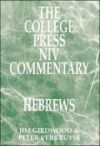
Hebrews
- Authors: Jim Girdwood and Peter Verkruys
- Publisher: College Press
- Pages: 436
The exalted character of the Son of God is the theme and dynamic of this pivotal book of the New Testament. Jesus is the heir of all things; He is the Creator and also Reflector of God's glory. He has the stamp of God's nature, He upholds the universe with his power, and He is seated at the right hand of God. Do you want to understand the work of our Lord? Do you want to see how His qualities shine as the noonday sun? Do you desire to know what He is really like and the magnitude of what He has done, is doing, and what He will bring to pass? Here in the book of Hebrews, these things are clearly viewed. Jesus is both the fulfillment of the old covenant and the inaugurator of the new covenant. What the covenants mean and how they operate is fundamental to theological clarity. Hebrews is where the old and new covenants are fully discussed. Two very capable navigators will lead you through the text, pausing to point out the highlights, explaining some of the difficulties and leading you to a deeper appreciation and understanding of who Jesus is as revealed in the book of Hebrews.
Jim Girdwood, Ph.D, earned degrees in ministry, language, history, and Bible at Great Lakes Christian College and Cincinnati Christian Seminary. He finished his Ph.D. at Hebrew Union College in 1970. Dr. Girdwood has taught at Great Lakes Christian College, Lincoln Christian Seminary, and Ozark Christian College. He is currently teaching at Kentucky Christian College in Grayson, KY.
Peter A. Verkruyse, Ph.D, currently teaches at Illinois College in Jacksonville, IL. Peter received his B.A. in Christian Ministries from Lincoln Christian College, his M.A. in Homiletics and M.Div. in New Testament from Lincoln Christian Seminary, the M.A. and Ph.D. in Rhetorical Theory and Criticism from the University of Illinois (at Urbana-Champaign).
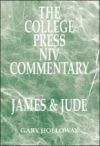
James & Jude
- Author: Gary Holloway
- Publisher: College Press
- Pages: 203
The epistles of James & Jude hold a very unique position in the New Testament Canon. The writers of these episles are brothers of our Lord Jesus Christ! It would be difficult for us to imagine the profound effect this relationship would have on these two men. However, what it brings to their inspired writings is a direct, personal, and intimate look at the Living Word.
James and Jude hold one other unique credential that undergirds their epistles. It is likely neither brother believed in Jesus' deity until after the Resurrection. The Apostle Paul writes it took a special and personal appearance to James to finally convince him of Jesus' Lordship. Combined with their testimony, this translates out to very powerful proof of the Resurrection of Jesus Christ.
Gary Holloway is Director of Graduate Bible Studies, Lipscomb University, Nashville, Tennessee. Formerly he served as Associate Professor at the Institute for Christian Studies in Austin, Texas and ministered with the Holland Street Church of Christ in San Marcos.

1 & 2 Peter
- Author: Allen Black and Mark Black
- Publisher: College Press
- Pages: 225
These two letters of Peter were written to first century Christians needing clear instructions about their faith in Christ. By the leading of the Holy Spirit, these letters have remained timeless. No matter which period of church history one might want ot discuss, these letters fit well. Christian character, holiness, the Day of Judgment, and the Second Coming are always important to the proper development of a Christian's faith.
Allen Black, Ph.D., is Associate Professor at Harding University raduate School of Religion, Searcy, Arkansas. Dr. Black holds the A.A. in Bible from Freed-Hardeman University, the B.A. in Bible and English along with the M.Th. in New Testament from Harding University, and the Ph.D. from Emory University.
Mark C. Black, Ph.D., is Associate Professor of Bible at David Lipscomb University, Nashville, Tennessee. He is also Associate Minister at the Donelson Church of Christ. Before coming to Lipscomb he was the preacher for the Okolona Church of Christ in Louisville, kentucky.
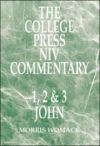
1, 2, & 3 John
- Author: Morris Womack
- Publisher: College Press
- Pages: 193
John's presentation of the physical aspects of the resurrection are unparalleled! This study examines John's answer to these "new" brands of Gnosticism sweeping our churches. Dr. Womack has succeeded in building a bridge from the first century to the twenty-first century, providing the tools needed to guard our hearts against these dangerous beliefs.
Morris M. Womack is professor of Communication at Pepperdine University in Malibu, California. Dr. Womack holds the B.D. in Church History and New Testament from Butler University and the Ph.D. from Wayne State University. He has served as a full-time and interim minister for several congregations.
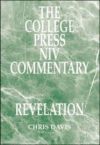
Revelation
- Author: Chris David
- Publisher: College Press
- Pages: 393
Dr. Davis places Revelation in its historical, cultural, and literary setting, showing how the book would have been understood by the Christians for whom it was written. He draws on Jewish, Christian, Greek, and Roman writers from biblical times in seeking to discern the meaning of the book's vivid symbols. He thus bases his interpretation of Revelation on objective evidence, rather than on subjective speculation.
The commentary was written for the general reader of the Bible who desires to understand Revelation as John intended it to be understood. In providing a clear, nontechnical exposition of Revelation, Dr. Davis draws on his years of experience in teaching the book to teens and adults in college and church settings.
Dr. Christopher Davis is a graduate of Johnson Bible College (B.A., B.Th.) and Union Theological Seminary in Virginia (Th.M., D.Min., Ph.D.). He serves as both Professor of New Testament and Vice President of Academics for Minnesota Bible College of Rochester, Minnesota. He is also Visiting Professor of New Testament for the School of Graduate Studies of Hope International University, which is based in Fullerton, California.
Reviews
5 ratings

Faithlife User
8/23/2024
Conservative exegesis. Thorough rendering of terms from original language(s). Most include study questions to deepen understanding. Recommend.
Dennis Wilson
1/25/2019
Mark Beard
11/23/2016

Ronald Lawrence
8/21/2014
Brian J Munro
10/21/2013